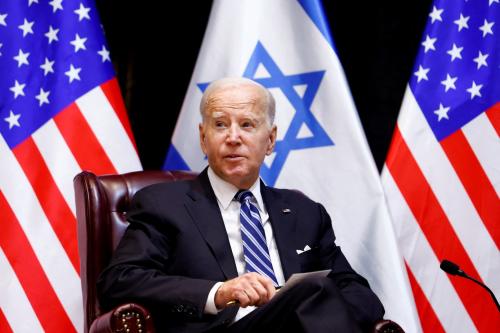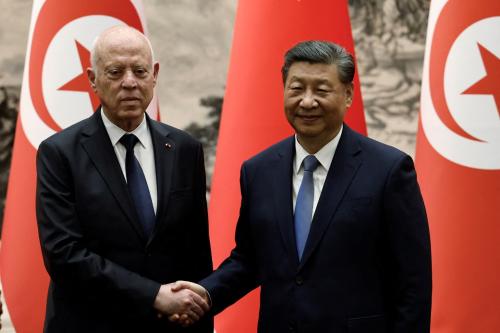Israeli Prime Minister Benjamin Netanyahu’s address to a joint session of Congress occurred on two different levels. There was the substance of the speech itself: a long, impassioned, and detailed defense of Israel as it faces a level of international opprobrium not seen in decades; and there was the political spectacle of the speech—for Israeli and American audiences alike. It was the spectacle that was the real reason it took place.
Netanyahu is an embattled and unpopular leader of a bitterly divided and traumatized country after the atrocities of October 7 and even before. He is working to hold on to power and postpone political reckoning, with several potential coalition crises looming. All this while the country faces a long war on multiple fronts, tens of thousands of Israeli civilians are displaced from border towns, and the politically supercharged plight of 115 remaining Israeli hostages is still unsolved. The widespread international condemnation over the death toll and devastation in Gaza has added to Israelis’ sense of indignation and besiegement, but it offers Netanyahu a political opening as a spokesperson.
Substantively, the speech spanned October 7 through the present, confronting the accusations against Israel, from genocide to being a colonial state. Netanyahu presented several guests he brought with him, including a freed hostage, the grandfather of an Israeli toddler and baby kidnapped to Gaza with their parents, and a Muslim Israeli soldier and an officer of an Ethiopian-Jewish family, both of whom fought on October 7. All were meant to show an Israel that was diverse, deeply wounded, fighting for its defense against what he called the barbarism of Hamas and its surprise attack, and far from the supposedly genocidal aggressor it is accused of being in many quarters.
As he often does, he argued that Israel’s current broad fight against Iran and its proxies is directly tied to an American interest in doing the same. And, most notably in policy terms, he called for a swifter supply of arms to Israel, a line that did not receive much Democratic applause, arguing that that would hasten Israel’s victory and end the war sooner.
Netanyahu gave no hint in the speech as to whether a cease-fire and hostage release deal was imminent, the key policy question at the moment. However, an Israeli delegation is heading back to negotiations and Netanyahu previously told the hostages’ angry families that conditions for a deal were “ripening.” With the Israeli parliament, the Knesset, about to go on recess, there is some chance he would take such a move, should Hamas sign on, despite the risks it poses to his coalition.
Netanyahu also used the speech to try and counter the accusations that he has not laid out a strategic end game for the war, thereby damaging the war effort itself and contributing to the devastation Israel’s operation has wrought. He said his plan—though still woefully short on detail and extremely late—was a demilitarized, de-radicalized Gaza, governed by Palestinians who were not committed to fighting Israel, and secured by Israel itself.
A “league of his own”
The substance of the speech would be a salve to many Israelis, who feel deeply and unfairly maligned, and to their supporters. But the speech was meant, first and foremost, as several political theaters wrapped in one: a political act for Netanyahu, for Republicans in Congress, and, against their wishes, for Democrats.
Having failed to receive an invitation to the White House since he formed his current right-to-extreme-right coalition with a radical domestic agenda, Netanyahu got an invitation from Congress, the alternative route to Washington which he used in 2015. It was the image he craved: him, fighting on the highest global stages for Israel’s (and his) reputation, to the sound of applause.
In Israel’s tumultuous recent years, with repeated elections, Netanyahu campaigned with giant billboards showing him shaking the hands of world leaders above the slogan “a league of his own.” The subtext was that no other Israeli politician could operate on the international stage as Netanyahu does. His speech in Congress was, in a sense, his application to be readmitted to that league of his own in his voters eyes.
Netanyahu was leaning on his original political skill, the one that propelled him to the national stage: making Israel’s case in pristine English and American-style, sound-bite-ready delivery. At the Madrid peace conference of 1991, the 42-year-old Netanyahu stood out as the Israeli delegation’s most capable international spokesperson, catapulting him to the leadership of his party two years later and the prime minister’s office in 1996.
This political tool, however, is likely insufficient for Netanyahu by itself. He has a great deal of political ammunition left—in particular, the fact that elections are not mandated for two more years—but his coalition remains shaky, and he is a known quantity, his oratory ability already baked into his polling numbers.
Democratic wedge, Republican hammer
For the Republican leadership, the speech was an easy, though limited, win. It was an attempt to drive deeper the wedge among Democrats who are today divided on Israel and between them and the median American voter. Every time House Minority Leader Hakeem Jeffries had to awkwardly decide whether to applaud or rise to his feet alongside Republican lawmakers was a small success for Republican House Speaker Mike Johnson. Indeed, when Netanyahu went on the offensive, calling out American protesters and even university leaders, he was touching on issues that divide the Democratic base, creating a minor live-streamed headache for at least some of the Democratic lawmakers in an election year.
Here too, though, it is hard to see the speech as a political coup for Republicans. It was a headache for Democrats, but it was overshadowed by the political drama of the past few weeks in the United States, including an assassination attempt on a candidate, the withdrawal of another, and the likely ascension of a third. Americans, just like Israelis and all others, find their own affairs most interesting of all, and the speech, at the end of the day, was secondary news for the American public.
There was another Republican angle for Netanyahu. Donald Trump, who may return to the Oval Office in a matter of months, had been furious with Netanyahu for the sin of congratulating Joe Biden on his election victory, even while Trump was still falsely claiming the elections were rigged. Netanyahu went out of his way in the speech to name and thank Trump for his support of Israel. Yet he also tried to allay, somewhat, the perception that he was siding with Republicans by thanking Biden and lawmakers from “all sides” of the aisle for their support of Israel since October 7.
This is the flipside of Netanyahu’s ability to perform on such a stage. He is unmatched in Israel in this skill, but he is also unmatched in the polarization he has created around Israel in the United States. Indeed, Vice President Kamala Harris was in Indiana at the time of the speech for a pre-scheduled event. She was thus unavailable to preside over the Senate, where she would have found herself in every frame behind Netanyahu, her every expression or decision to applaud or abstain from it monitored by millions. In 2015, then-Vice President Joe Biden was also traveling and unavailable for Netanyahu’s speech against the Obama administration’s Joint Comprehensive Plan of Action (the “Iran deal”).
Harris was and is walking a fine line. She has repeatedly voiced her support for Israel and its right to defend itself. She has championed the cause of Israeli hostages and victims of sexual violence since October 7. Second Gentleman Douglas Emhoff has been active in the administration’s national strategy to combat antisemitism, which has become far more prevalent in the Jewish experience in recent months. Harris has been a staunch support of Israel, much like President Biden.
At the same time, Harris has also been a prominent voice at the top of the administration raising concern about Israel’s conduct in the war and the immense cost in life and infrastructure in the Gaza Strip. She has spoken out against the rise in Islamophobia. And most consequently for the actual conduct of the war, hers was one of the more strident voices among senior administration officials in direct communications with Israeli leaders.
That stance—some, though not much, distance from Biden, especially on the plight of Gazans, while maintaining a traditional embrace of Israel as an ally—is likely the political approach Harris will aim to maintain for the campaign. I suspect that this is also her genuine inclination, which may continue after January, were she elected.
Yet Democratic or Republican considerations were not Netanyahu’s main concern, for better or worse. Very few Democrats or Republicans are eligible to vote in Israeli elections. Indeed, Netanyahu did not come to Washington to meddle with American presidential politics. Rather, Netanyahu was trying to use the U.S. congressional setting for Israeli politics.





Commentary
Netanyahu looks to rejoin a “league of his own”
July 25, 2024